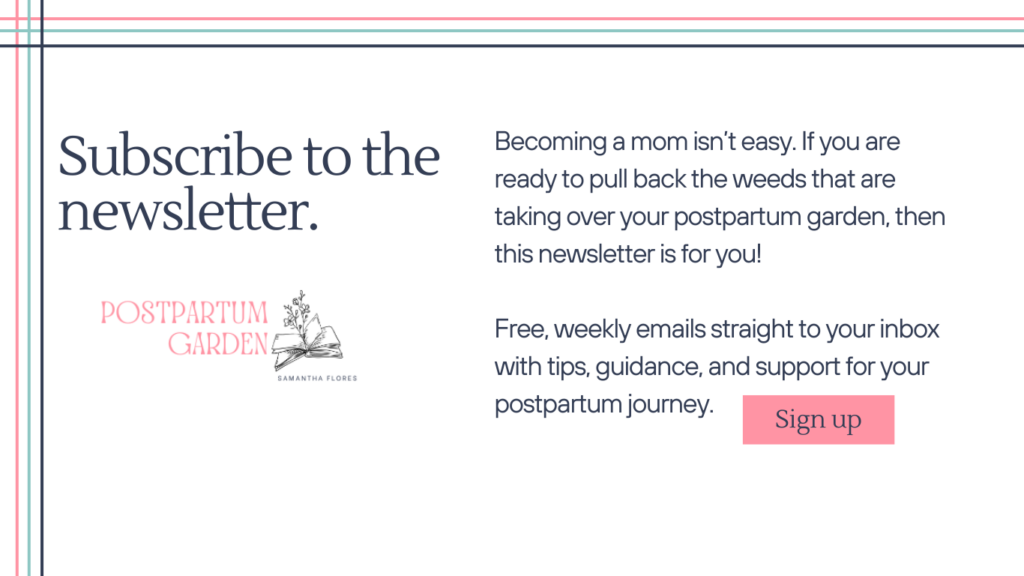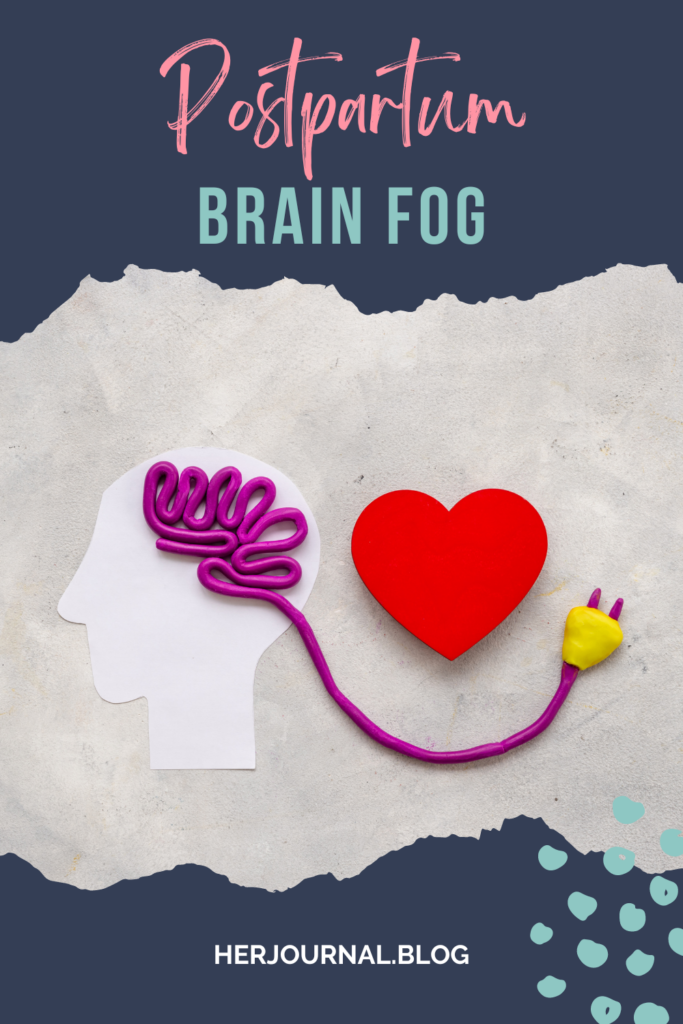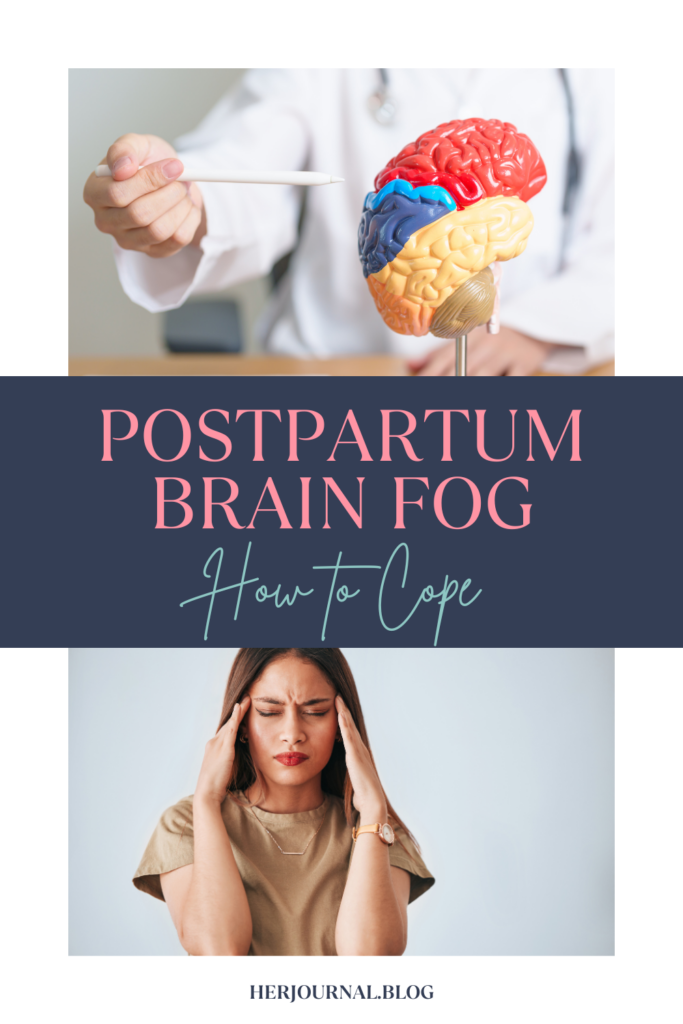We may earn money or products from the companies mentioned in this post.
You’ve surely heard the phrase “mom brain” as it refers to the forgetfulness of mothers in postpartum. In many cases, it’s a comical incident. However, what mothers don’t always realize is that there is a reason behind this postpartum brain fog that can actually last well past the early months after birth.
It’s very obvious that a mother’s body goes through a plethora of changes during pregnancy. What about the internal changes that you can’t see in pregnancy and postpartum?
It’s important to understand the changes that happen to mothers after birth. If you are a mother, regardless of how many babies you have or how many years it’s been since your last birth experience, you may be surprised to learn about postpartum brain changes and what they mean for your motherhood experience.
Related: Postpartum Mood Disorders: How to Assess Yourself for PPD

What is Postpartum Brain Fog and What Causes it?
In general, postpartum brain fog is described as forgetfulness, the inability to concentrate, and/or misplacing things. Currently, it is believed that this brain fog is caused by the fluctuating hormones in a postpartum woman, sleep deprivation, and the stress/anxiety of becoming a new mother.
In addition, to the above causes, it is also relevant to add that when you become a mother (either for the 1st time or the umpteenth time), your brain literally changes to become linked up to your baby. Specifically, the gray matter in your brain postpartum changes in regions related to the theory of mind processing. The gray matter in your brain is also responsible for your emotions. (Hmm, I wonder if there is a connection here to postpartum depression… *sarcasm intended*).
What’s more, these gray matter changes can persist up to six years postpartum and can be traced even decades later according to Nature Neuroscience. Mothers literally evolve with each pregnancy and postpartum experience.
Related: The First Month Postpartum: What to Expect After Birth

Why Does the Brain Change?
I can get so passionate about postpartum brain changes because they happen for such an incredible reason! Your brain is so focused on the survival of your baby that everything else doesn’t matter, which causes postpartum brain fog. Right now, your brain doesn’t care that you misplaced your car keys or that you can’t remember the word for that doohickey over there. It cares that your baby’s needs are being met.
Think of how much your baby grows and changes in the first year after birth, including all of the milestones they meet like every other week. Your brain has to change and evolve as your baby grows to keep up with all of the new things he/she is doing. What an amazing occurrence!
In addition, these brain changes have been known to serve grandmothers to link up with their own grandchildren. Mothers are amazing! While we wait for more research on the motherhood brain, take comfort in knowing that your brain is changing for a good reason.
7 Ways to Cope with Postpartum Brain Fog
Now that you know what causes postpartum brain fog, it’s time to understand how to cope. Unlike Cher, we can’t turn back time to undo these brain changes. Instead, we need to find ways to accept them.
Related: Is the 6-week Postpartum Checkup Enough for New Moms?

Use a Journal
Consider using a journal to help you jot down your thoughts. This can be helpful to remember things, but it can also be helpful to get all of the noise out of your mind. When you are feeling overwhelmed with the postpartum brain fog, clearing out space in your mind can help calm things down.
You can grab an inexpensive journal from a local store or order a fancy one online. If you fear that you’ll lose your journal, you can always opt for a digital one that you can use from your phone. For me, I use the Google Docs app on my phone and just journal from there.
Talk with Your Spouse/Partner
Communication is extremely important in the postpartum phase, especially when you are dealing with postpartum brain fog. Tell your spouse or partner what you are going through and how it makes you feel. Confide in them and let them be a shoulder for you.
Just because the postpartum brain fog happens for a good reason, that doesn’t mean it’s easy to experience. Your spouse or partner wants to help you. Keep them in the loop with how you are doing.
Focus on Nutrition
Nutrition is a big part of your postpartum recovery and your overall health. It also has an impact on your brain. Vitamins, minerals, and antioxidants nourish the brain. Nutrition promotes brain structure and function, cognitive function, mood, and mental health.
While you can get many important nutrition components from the food that you eat, you can also support your brain with the NEEDED Cognitive Support supplement. This supplement comes in the form of capsules and offers optimal nutrients to support daily cognitive performance, which includes mental clarity, focus, and energy.
The Cognitive Support supplement offers nine nootropic and botanical ingredients, all blended together to provide support for focus and attention, brain health and memory, and alleviate brain fog and eye fatigue. Use discount code postpartumsam on your purchase and get the support you need for postpartum brain fog.
Related: Postpartum Nutrition: What Mothers Need After Giving Birth

Incorporate Exercise
You don’t have to dedicate hours per day at a gym if you don’t want to. A simple daily walk in your neighborhood counts as exercise. I know how difficult it can be to incorporate exercise into your day with a baby. However, exercise is important in helping you cope with postpartum brain fog.
Exercise helps the brain in many ways, including increasing blood flow to the brain, improving mood and sleep, improving attention, increasing brain volume, and more. Start small and work your way up in your workout routine. You will be pleasantly surprised with how much exercise can help improve your brain and mindset.
Stay Hydrated
Hydration can easily be forgotten when you are focused on your baby’s needs. Water and electrolytes help promote cognitive function, reduce mental fatigue, support brain energy, and lead to clearer thinking.
If you are someone who isn’t a fan of drinking water, then consider adding NEEDED Hydration Packs to your daily routine (use code postpartumsam for your exclusive discount). These hydration packs are naturally flavored and do not have any additional sweeteners. They are refreshing and easy to pack in the diaper bag or your purse when you’re on the go.
Related: Postpartum Hormone Imbalance: How to Understand Your New Body
Give Yourself Grace
Above all, give yourself grace. Being a mother isn’t easy, no matter what stage you are in. Experiencing postpartum brain fog can be frustrating. However, it’s important to understand that you can’t control it and you can’t speed it up. Patience and grace will be your friends.

Ask for Help
The most important thing you can do for yourself is ask for help. When things become overwhelming (and they will), you can enlist your village to help carry the heavy stuff with you. Ask for meal trains, help with older children and/or pets, a shoulder to lean on, or just a nice coffee treat to brighten your day.
Postpartum isn’t meant to be something that you do alone. It takes a village to raise a child, and it also takes a village to raise a mother.
Other Questions Mothers Are Asking About Postpartum Brain Fog
If you want to learn more about postpartum brain fog, discover more questions new moms are asking below. You might be surprised to learn some of the answers.
Related: The 5-5-5 Postpartum Rule: What Is It and How to Use It
How long can postpartum brain fog last?
There isn’t enough research yet to give a definitive timeline on how long postpartum brain fog lasts. Each woman is unique and there are many factors to consider in life. However, as mentioned above, some studies show that postpartum brain changes can persist up to six years after birth. I would venture to say that, with more research, these changes will likely continue well past that timeframe.
Can you reverse the postpartum brain changes?
Postpartum brain changes happen as a natural, normal occurrence to having a baby. There is nothing that can be done to stop or reverse these changes. However, you can take time to create a plan for coping with the changes.
Motherhood requires you to change and adapt to become a newer version of yourself. This is the time to learn more about the new you. The more you fight these changes, the harder it will be for you. Acceptance is key in postpartum for every aspect.

What are the postpartum brain symptoms?
The most obvious postpartum brain fog symptoms include forgetfulness and difficulty concentrating. Unfortunately, there isn’t enough research right now to dive deeper into what other symptoms mothers might be experiencing.
Related: Postpartum Body Changes: How to Accept the New You
When is postpartum brain fog the worst?
This answer will be different for every mother individually. What you might think is the worst might not be the same for another mother. It’s important to keep a journal to help you track if you are getting better or worse and when might be the best time to see a professional for additional assistance.
The Postpartum Brain Fog Happens for a Reason
Your brain is focused on your baby’s needs and your survival. Everything else is extra. Postpartum brain fog isn’t meant to be an inconvenience, but a time that is sacred to you and your baby. In a world where we feel the slightest inconvenience when the traffic light stays red for too long or when we can’t find the right snack in aisle 29 where the app says it should be, it’s easy to let postpartum changes feel like they are ruining your life.
On the contrary, these postpartum brain changes are important for the bond between you and your baby. Don’t fight it. Instead, focus on coping with the changes. They cannot be stopped or reversed, but you can embrace them. Postpartum brain fog is helping you become the mother you are meant to be.
Don’t forget to grab your copy of The Fourth Trimester: A Postpartum Depression Guide.
Related: The Postpartum Period: How to Survive After Birth
Pin It!





